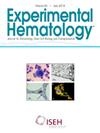Reconsidering the usual suspects in age-related hematologic disorders: is stem cell dysfunction a root cause of aging?
IF 2.1
4区 医学
Q2 HEMATOLOGY
引用次数: 0
Abstract
Aging exerts a profound impact on the hematopoietic system, leading to increased susceptibility to infections, autoimmune diseases, chronic inflammation, anemia, thrombotic events, and hematologic malignancies. Within the field of experimental hematology, the functional decline of hematopoietic stem cells (HSCs) is often regarded as a primary driver of age-related hematologic conditions. However, aging is clearly a complex multifaceted process involving not only HSCs but also mature blood cells and their interactions with other tissues. This review reappraises an HSC-centric view of hematopoietic aging by exploring how the entire hematopoietic hierarchy, from stem cells to mature cells, contributes to age-related disorders. It highlights the decline of both innate and adaptive immunity, leading to increased susceptibility to infections and cancer, and the rise of autoimmunity as peripheral immune cells undergo aging-induced changes. It explores the concept of “inflammaging,” where persistent, low-grade inflammation driven by old immune cells creates a cycle of tissue damage and disease. Additionally, this review delves into the roles of inflammation and homeostatic regulation in age-related conditions such as thrombotic events and anemia, arguing that these issues arise from broader dysfunctions rather than stemming from HSC functional attrition alone. In summary, this review highlights the importance of taking a holistic approach to studying hematopoietic aging and its related pathologies. By looking beyond just stem cells and considering the full spectrum of age-associated changes, one can better capture the complexity of aging and attempt to develop preventative or rejuvenation strategies that target multiple facets of this process.
重新考虑与年龄相关的血液病的常见疑点:干细胞功能障碍是衰老的根本原因吗?
衰老对造血系统产生深远的影响,导致对感染、自身免疫性疾病、慢性炎症、贫血、血栓形成事件和血液恶性肿瘤的易感性增加。在实验血液学领域,造血干细胞(hsc)的功能下降通常被认为是与年龄相关的血液学疾病的主要驱动因素。然而,衰老显然是一个复杂的多方面过程,不仅涉及造血干细胞,还涉及成熟血细胞及其与其他组织的相互作用。这篇综述通过探索从干细胞到成熟细胞的整个造血层次如何导致与年龄相关的疾病,重新评估了以造血干细胞为中心的造血衰老观点。它强调了先天免疫和适应性免疫的下降,导致对感染和癌症的易感性增加,以及随着外周免疫细胞经历衰老引起的变化,自身免疫的增加。它探索了“炎症”的概念,即由老的免疫细胞驱动的持续的、低度的炎症产生了组织损伤和疾病的循环。此外,本综述深入探讨了炎症和体内平衡调节在年龄相关疾病(如血栓形成事件和贫血)中的作用,认为这些问题是由更广泛的功能障碍引起的,而不是单纯由HSC功能损耗引起的。总之,这篇综述强调了采用整体方法研究造血老化及其相关病理的重要性。通过超越干细胞并考虑与年龄相关的全谱变化,人们可以更好地捕捉衰老的复杂性,并试图开发出更好地针对这一过程的多个方面的预防或恢复策略。
本文章由计算机程序翻译,如有差异,请以英文原文为准。
求助全文
约1分钟内获得全文
求助全文
来源期刊

Experimental hematology
医学-血液学
CiteScore
5.30
自引率
0.00%
发文量
84
审稿时长
58 days
期刊介绍:
Experimental Hematology publishes new findings, methodologies, reviews and perspectives in all areas of hematology and immune cell formation on a monthly basis that may include Special Issues on particular topics of current interest. The overall goal is to report new insights into how normal blood cells are produced, how their production is normally regulated, mechanisms that contribute to hematological diseases and new approaches to their treatment. Specific topics may include relevant developmental and aging processes, stem cell biology, analyses of intrinsic and extrinsic regulatory mechanisms, in vitro behavior of primary cells, clonal tracking, molecular and omics analyses, metabolism, epigenetics, bioengineering approaches, studies in model organisms, novel clinical observations, transplantation biology and new therapeutic avenues.
 求助内容:
求助内容: 应助结果提醒方式:
应助结果提醒方式:


